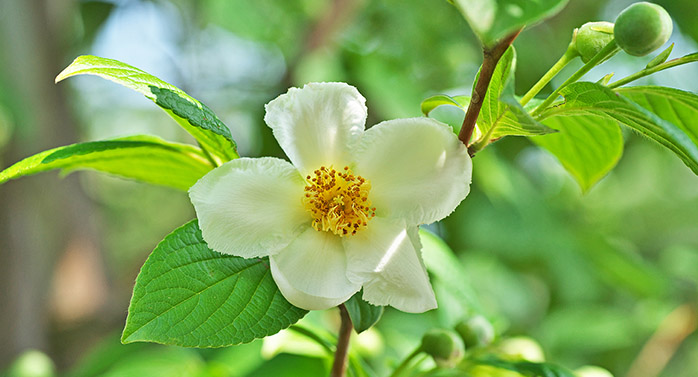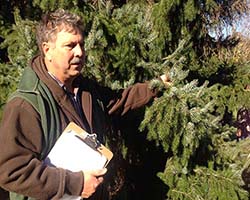
“There’s been a movement in recent years toward the belief that non-native plants are an ecological threat but this isn’t true in all instances. An educated use of non-natives can add diversity, ornamental interest, and value to any landscape. One example is the Japanese Stewartia. To many landscape architects it’s a connoisseur’s plant.”
The Stewartia grows well in New Jersey, and Kristoph has planted it many times. “There’s a need for non-native plants,” he says. “Not all of them are invasive and troublesome.”
Kristoph will be teaching two courses at Rutgers in the month of July: “The Woody Plants of Summer: Native Plants” on July 25 and “The Woody Plants of Summer: Non-Native Plants” on July 31. Both classes involve a brief lecture followed by an outdoor walk where students will view specimens. You can still sign up for both courses.
 About Steve Kristoph
About Steve Kristoph
Steve Kristoph is widely known for his encyclopedic knowledge of plant material. He received his Bachelors and Masters degrees in horticulture from Rutgers University, and he has been an adjunct instructor at Rutgers for over 25 years. He also owns and operates Steven Kristoph Nursery in Monmouth County, NJ, where he grows many types of ornamental trees, shrubs and herbaceous perennials.

I am a garden writer and want to write about this in my weekly column for our local newspaper.. Thanks for raising an issue that’s really been bothering me. First, to blame all nonnative plants for the bad habits of some isn’t fair. But more important, what’s always missing in this discussion is the overwhelmingly negative impact of industrial agriculture. Asking homeowners to bear the burden of offsetting the effects of what Big Ag does to the planet is impractical and also misleading because it’s impossible. We CAN’T offset those impacts. And attempting to is really just a distraction from the more important fight, unless the effort itself raises awareness of the larger problem.
True that no one or a few homeowners can offset industrial agriculture.
But
1. Ecosystem services from yard, commercial, and urban plantings DO matter. Native plants host native insects that feed birds and wildlife. Non-native plants DON’T.
*Strong indications are that insect and bird populations are crashing over the last decades.
2. Too many “safe” ornamentals have proven otherwise after they became broadly planted. Bartlett/Callery pear is one notorious example. Do we need more??
To change entrenched habits, we need to get as much of the community to understand and participate as we can. Individual homeowners equally cannot have material impact on carbon contributions, landfill overload, water management, air pollution, and numerous other big problems– but we need the whole community to become engaged to make their small contributions because these shared problems are OUR problem and the collective impact is material.
PS: There seems to be a serious conflict of interest in asking the owner of a nursery whose business is selling non-native ornamentals to weigh in on the benefits/deficits of non-native plants. On a small scale, this is like asking the Koch brothers if burning coal is good for the world . The answer CANNOT be unbiased 🙁